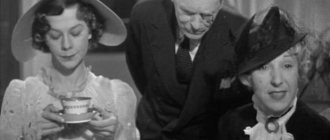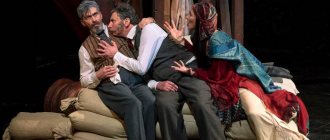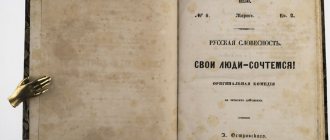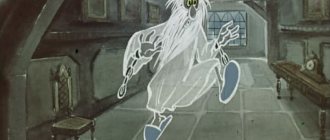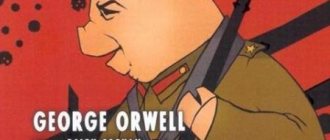Bald singer
Bourgeois English interior. English evening. English couple - Mr and Mrs Smith.
The English clock strikes seventeen English strokes. Mrs. Smith says that it is already nine o'clock. She lists everything they had for dinner and makes food plans for the future. She is going to buy Bulgarian yogurt, because it is good for the stomach, kidneys, appendicitis and “apotheosis” - that’s what Dr. Mackenzie-King said, and you can trust him, he never prescribes remedies that he has not tried on himself. Before performing the operation on the patient, he first underwent the same operation himself, although he was absolutely healthy, and it was not his fault that the patient died: his operation was simply successful, and his patient’s operation was unsuccessful.
Continued after advertisement:
Mr. Smith, reading an English newspaper, is amazed why in the civil status section they always indicate the age of the deceased and never indicate the age of newborns; it seems absurd to him. The newspaper says Bobby Watson has died. Mrs. Smith gasps, but her husband reminds her that Bobby died "two years ago" and they attended his funeral a year and a half ago. They discuss all the members of the deceased's family - all of them are called Bobby Watson, even his wife, so they were always confused, and only when Bobby Watson died did it finally become clear who was who.
The Smiths' maid appears, Mary, who spent a pleasant evening with a man: they went to the movies, then drank vodka with milk, and after that they read the newspaper. Mary reports that the Martins, whom the Smiths were waiting for dinner, are standing at the door: they did not dare to enter and were waiting for Mary to return. Mary asks the Martins to wait until the Smiths, who no longer hoped to see them, change clothes. Sitting opposite each other, the Martins smile shyly: it seems that they have already met somewhere, but they can’t remember where. It turns out that both of them are from Manchester and only left there two months ago. By a strange and amazing coincidence, they were traveling on the same train, in the same carriage and in the same compartment. In London, both of them, oddly enough, live on Bromfield Street, in house number 19. And another coincidence: they both live in apartment number 18 and sleep on a bed with a green feather bed. Mr. Martin suggests that it was in bed that they met, perhaps even that it was last night. And they both have a charming two-year-old daughter, Alice, who has one white eye and the other red. Mr. Martin assumes that they are the same girl. Mrs. Martin agrees that this is quite possible, although surprising. Donald Martin thinks for a long time and comes to the conclusion that this is his wife Elizabeth. The couple are happy that they have found each other again.
Briefly exists thanks to advertising:
Mary slowly reveals one secret to the audience: Elizabeth is not Elizabeth at all, and Donald is not Donald, because Elizabeth’s daughter and Donald’s daughter are not the same person: Elizabeth’s daughter has a red right eye, and her left eye is white, and Donald’s daughter has a red eye. vice versa. So, despite the rare coincidences, Donald and Elizabeth, not being the parents of the same child, are not Donald and Elizabeth and are mistaken in imagining themselves as such. Mary tells the audience that her real name is Sherlock Holmes.
The Smith couple enter, dressed exactly as before. After meaningless (and completely unrelated) phrases, Mrs. Martin says that on the way to the market she saw an extraordinary picture: near a cafe, a man bent down and tied his shoelaces. Mr. Martin witnessed an even more incredible sight: a man was sitting on the subway reading a newspaper. Mr. Smith suggests that it may be the same person.
The doorbell rings. Mrs. Smith opens the door, but there is no one behind her. Just as she sits down again, another bell rings. Mrs. Smith opens the door again, but again there is no one behind her. When the doorbell rings for the third time, Mrs. Smith does not want to get up, but Mr. Smith is sure that once the doorbell rings, it means there is someone outside the door. To avoid quarreling with her husband, Mrs. Smith opens the door and, seeing no one, comes to the conclusion that when the doorbell rings, there is never anyone there. Hearing a new bell, Mr. Smith answers it himself. The fire brigade captain is standing behind the door. The Smiths tell him about the dispute. Mrs. Smith says that this is only the fourth time someone has been through the door, and only the first three times count. Everyone is trying to find out from the Fireman who called the first three times. The fireman replies that he stood outside the door for forty-five minutes, didn’t see anyone, and only rang the bell twice: the first time he hid to laugh, the second time he entered. The fireman wants to reconcile the spouses. He believes that they are both partly right: when the doorbell rings, sometimes there is someone there, and sometimes there is no one there.
Continued after advertisement:
Mrs. Smith invites the Fireman to sit with them, but he came on business and is in a hurry. He asks if anything is on fire; he was given orders to extinguish all fires in the city. Unfortunately, neither the Smiths nor the Martins have anything on fire. The fireman complains that his work is unprofitable: there is almost no profit. Everyone sighs: it’s the same everywhere: both in commerce and in agriculture. There is sugar, however, and only because it is imported from abroad. It’s more difficult with fires - there is a huge duty on them. Mr. Martin advises the Fireman to visit the Wakefield priest, but the Fireman explains that he has no right to put out fires for clergy.
Seeing that there is nowhere to rush. The fireman stays with the Smiths and tells anecdotes from his life. He tells a fable about a dog who didn't swallow his trunk because he thought he was an elephant, the story of a calf who ate too much crushed glass and gave birth to a cow who couldn't call him "mama" because he was a boy and couldn't call him “dad” because he was small, which is why the calf had to marry one person. The others also take turns telling jokes. The Fireman tells a long, meaningless story, in the middle of which everyone gets confused and asks to repeat it, but the Fireman is afraid that he has no time left. He asks what time it is, but no one knows: the Smiths have the wrong clock, which, in the spirit of contradiction, always shows the exact opposite time. Mary asks permission to tell a joke too. The Martins and Smiths are indignant: the maid should not interfere in the conversations of the owners. The fireman, seeing Mary, joyfully throws himself on her neck: it turns out that they have known each other for a long time. Mary recites poetry in honor of the Fireman until the Smiths push her out of the room. It's time for the fireman to leave: in three quarters of an hour and sixteen minutes a fire should start on the other side of the city. Before leaving, the Fireman asks how the bald singer is doing, and, hearing from Mrs. Smith that she still has the same hairstyle, calmly says goodbye to everyone and leaves.
Briefly exists thanks to advertising:
Mrs. Martin says, "I can buy a penknife for my brother, but you can't buy Ireland for your grandfather." Mr. Smith replies, “We walk with our feet, but we heat ourselves with electricity and coal.” Mr. Martin continues: “Whoever took the sword scored the ball.” Mrs. Smith teaches: “Life should be observed from a carriage window.” Gradually, the exchange of remarks takes on an increasingly nervous character: “Cockatoo, cockatoo, cockatoo...” - “As I walk, so I walk, as I walk, so I walk...” - “I walk along the carpet, along the carpet...” - “You walk while you’re lying.” , while you're lying..." - "Cactus, crocus, cockade, crow!" - “The more saffron milk caps, the fewer stalks!” The lines are getting shorter and shorter, everyone is shouting into each other’s ears. The light goes out. In the darkness you can hear faster and faster: “That-not-there-that-that-yes...” Suddenly everyone falls silent, The lights come on again. Mr. and Mrs. Martin are sitting like the Smiths at the beginning of the play. The play begins again, with the Martins repeating the Smiths' lines word for word.
The curtain falls.
Summary: Bald singer
It's an English evening, the married couple Mr and Mrs Smith are surrounded by a bourgeois English interior. Seventeen English strokes strike the English clock. Mrs. Smith reports that it is already nine o'clock. She lists what she ate for dinner and plans further meals. Considering buying Bulgarian yogurt - Dr. Mackenzie-King said that it is good for the kidneys, stomach, appendicitis and apotheosis, and Dr. Mackenzie-King can be trusted, he does not attribute remedies that have not been tested on himself. When it was necessary to perform an operation on a patient, the doctor first performed it on himself, although he did not need it at all. True, the patient died anyway, but the doctor is not to blame for this, the operation on himself was very successful, but the one performed on the patient was unsuccessful.
Mr. Smith reads an English newspaper and is amazed that the civil competitions section will not fail to report the age of the deceased, but has never reported the age of the newborn: this is simply absurd. The newspaper wrote about the death of Bobby Watson, Mrs. Smith is amazed, but her husband reminds him that Bobby died two years ago, and that they themselves attended his funeral a year and a half ago. They go through the members of that Watson's family - everyone in their family is called Bobby Watson, even his wife has that name, so they are constantly confused, and only when Bobby died did it become clear which of them was which.
Mary, the Smiths' maid, comes after an evening spent with a pleasant man: they went to the cinema, drank vodka with milk, and then read the newspaper together. The Martins, the maid reports, whom the Smiths are expecting for dinner, are already standing at the door - they were waiting for Mary, not daring to enter. Mary asks them to wait while the Smiths, who have already stopped waiting for guests, change clothes. The Martins sit opposite each other and smile shyly: they seem to have met somewhere before, but here’s where. It turns out that the Martins are both from Manchester and left there two months ago. It’s strange that they had to travel not only on the same train, but also in the same carriage, and even in the same compartment. They both live in London at number nineteen Bromfield Street. There is also another coincidence: both Martins live in apartment number eighteen and even sleep on a bed with a green feather bed. Mr. Martin suggests that it was there, by the bed with the green feather bed, that they met earlier, and perhaps it was last night. Both have a charming daughter, Alice, two years old, with one white eye and one red. Mr Martin thinks it could be the same girl. Mrs. Martin agrees with him - although such a coincidence seems extremely surprising, it may well be. After much thought, Donald Martin concludes that his wife Elizabeth is sitting opposite him. Both are incredibly happy to have found each other again.
Addressing the audience, Mary slowly reveals a secret: Donald is not Donald at all, Elizabeth is not Elizabeth at all, since Donald and Elizabeth’s daughter are not the same Alice, Donald’s daughter has a red left eye and a white right eye, while with daughter Elizabeth it’s the other way around. So, despite all the unprecedented coincidences, Elizabeth and Donald are not the parents of the same child, they cannot be Donald and Elizabeth, and, imagining themselves as such, they are greatly mistaken. Mary also tells the audience that her real name is Sherlock Holmes.
The Smith couple enter, dressed in the same clothes as before. Everyone exchanges several unrelated and meaningless phrases, after which Mrs. Martin tells how, on the way to the market, she happened to observe a strange picture: next to the cafe, a man was bending over, tying his shoelaces. Mr. Martin tells of an even more surprising incident: a man was sitting on the subway reading a newspaper. Mr. Smith suggests that both were the same strange man.
When the doorbell rings, Mrs. Smith opens it, but there is no one there. As soon as she sits down, the bell rings again. Mrs. Smith opens the door, but it is empty again. After the third ring, Mrs. Smith does not want to get up, but Mr. Smith believes that there must be someone behind the door, since they are ringing there. To avoid a quarrel, Mrs. Smith gets up for the third time, opens the door, sees that there is no one there and comes to the conclusion: if the doorbell rings, it means there is no one behind it. After the next call, Mr. Smith opens the door himself and sees the Fire Brigade Captain behind it. The Smiths talk about a dispute that arose between them. Mrs. Smith says that only after the fourth ring was there really someone at the door, but only the first three times should be counted. The company is trying to find out from the Captain who rang the doorbell the first three times. He replies that he stood for forty-five minutes outside the door, but did not see anyone there during all this time. He himself called twice: he hid for fun the first time, but the second time he entered. The fireman tries to reconcile the Smiths, claims that they are both right: if the doorbell rings, there is either someone behind it or there is no one.
Mrs. Smith invites the Captain to sit with them, but he is in a hurry and came solely on business. The fireman asks if anything caught fire, because he is ordered to put out all the fires that arise in the city. Unfortunately, none of them have anything on fire, and the Fireman complains about the unprofitability of his work: there is no profit from it. Everyone sighs knowingly, the same thing is observed everywhere: in agriculture and in commerce. True, there is sugar, but it is there only because it was imported from abroad. With fires, the situation is worse; the duty on them is very high. Mr. Martin recommends that the captain visit the Weckfield priest, but he refuses: he has no right to put out fires that arise among clergy.
Apparently, he has nowhere to hurry, and the Fireman remains to sit and begins to tell life anecdotes. He talks about a dog who thought he was an elephant and therefore did not swallow his trunk, about a calf who, after eating too much crushed glass, gave birth to a cow, but she could not call the calf “mother” because it was a boy, She also couldn’t call him “dad” because he was small, so the calf was forced to marry a certain person. The rest join in and also tell jokes, one by one. The Fireman told a meaningless but very long story, in the middle of which everyone got completely confused and asked to repeat it all over again, but the Fireman no longer had time for this. He tries to find out what time it is, but no one knows: the Smiths' watch, consumed by a sense of contradiction, constantly shows the opposite time. Mary asks permission to tell her joke. The Smiths and Martins are outraged: the maid should not interfere in the master's conversations. The fireman joyfully throws himself on Mary’s neck; as it turns out, they have known each other for a long time. Mary reads poetry in his honor until the Smiths push the maid out of the room. The fireman must go, in three quarters of an hour and another sixteen minutes a fire must begin on the opposite side of the city. Before leaving, he asks about the health of the bald singer, finds out that she still has the same hairstyle, calms down, says goodbye and leaves.
Mrs. Martin declares that she can buy her brother a penknife, but the rest of those present cannot buy Ireland for their grandfather. Mr. Smith responds by saying that they can walk on their feet, but are heated by coal and electricity. Mr. Martin says that the one who took the sword scored the ball, and Mrs. Smith instructively proclaims that life should only be observed from the carriage window. The exchange of remarks becomes more and more nervous, the following can be heard: “Cockatoo, cockatoo...”, “As I walk, as I walk...”, “I’m walking on the carpet...”, “You walk while you’re lying...”, “Cactus, crocus” cok...” , “More saffron milk caps - fewer stalks.” The lines become shorter and everyone starts yelling loudly into each other's ears. The light goes out, and in the darkness an accelerating sound is heard: “It’s not-there-it’s-that-yes...”. Suddenly everything calms down and the lights come on. The Martins sit as the Smiths sat at the beginning of the play. And the same play begins again, only now the Martins repeat the Smiths’ lines - word for word...
A brief summary of the play “The Bald Singer” was retold by A.S. Osipova.
Please note that this is only a brief summary of the literary work “The Bald Singer”. This summary omits many important points and quotes.
Ionesco “The Bald Singer” - summary
Ionesco
— all works
Page: [ 1 ]
Bourgeois English interior. English evening. English couple - Mr and Mrs Smith.
The English clock strikes seventeen English strokes. Mrs. Smith says that it is already nine o'clock. She lists everything they had for dinner and makes food plans for the future. She is going to buy Bulgarian yogurt, because it is good for the stomach, kidneys, appendicitis and “apotheosis” - that’s what Dr. Mackenzie-King said, and you can trust him, he never prescribes remedies that he has not tried on himself. Before performing the operation on the patient, he first underwent the same operation himself, although he was absolutely healthy, and it was not his fault that the patient died: his operation was simply successful, and his patient’s operation was unsuccessful.
Mr. Smith, reading an English newspaper, is amazed why in the civil status section they always indicate the age of the deceased and never indicate the age of newborns; it seems absurd to him. The paper says Bobby Watson has died. Mrs. Smith gasps, but her husband reminds her that Bobby died "two years ago" and they attended his funeral a year and a half ago. They discuss all the family members of the deceased - all of them are called Bobby Watson, even his wife, so they were always confused, and only when Bobby Watson died did it finally become clear who was who.
The Smiths' maid appears, Mary, who spent a pleasant evening with a man: they went to the movies, then drank vodka with milk, and after that they read the newspaper. Mary reports that the Martins, whom the Smiths were waiting for dinner, are standing at the door: they did not dare to enter and were waiting for Mary to return. Mary asks the Martins to wait until the Smiths, who no longer hoped to see them, change clothes. Sitting opposite each other, the Martins smile embarrassedly: it seems that they have already met somewhere, but they can’t remember where. It turns out that both of them are from Manchester and only left there two months ago. By a strange and amazing coincidence, they were traveling on the same train, in the same carriage and in the same compartment. In London, both of them, oddly enough, live on Bromfield Street, in house number 19. And another coincidence: they both live in apartment number 18 and sleep on a bed with a green feather bed. Mr. Martin suggests that it was in bed that they met, perhaps even that it was last night. And they both have a charming two-year-old daughter, Alice, who has one white eye and the other red. Mr. Martin assumes that they are the same girl. Mrs. Martin agrees that this is quite possible, although surprising. Donald Martin thinks for a long time and comes to the conclusion that this is his wife Elizabeth. The couple are happy that they have found each other again.
Mary slowly reveals one secret to the audience: Elizabeth is not Elizabeth at all, and Donald is not Donald, because Elizabeth’s daughter and Donald’s daughter are not the same person: Elizabeth’s daughter has a red right eye, and her left eye is white, and Donald’s daughter has a red eye. vice versa.
So, despite the rare coincidences, Donald and Elizabeth, not being the parents of the same child, are not Donald and Elizabeth and are mistaken in imagining themselves as such. Page 1 ]
